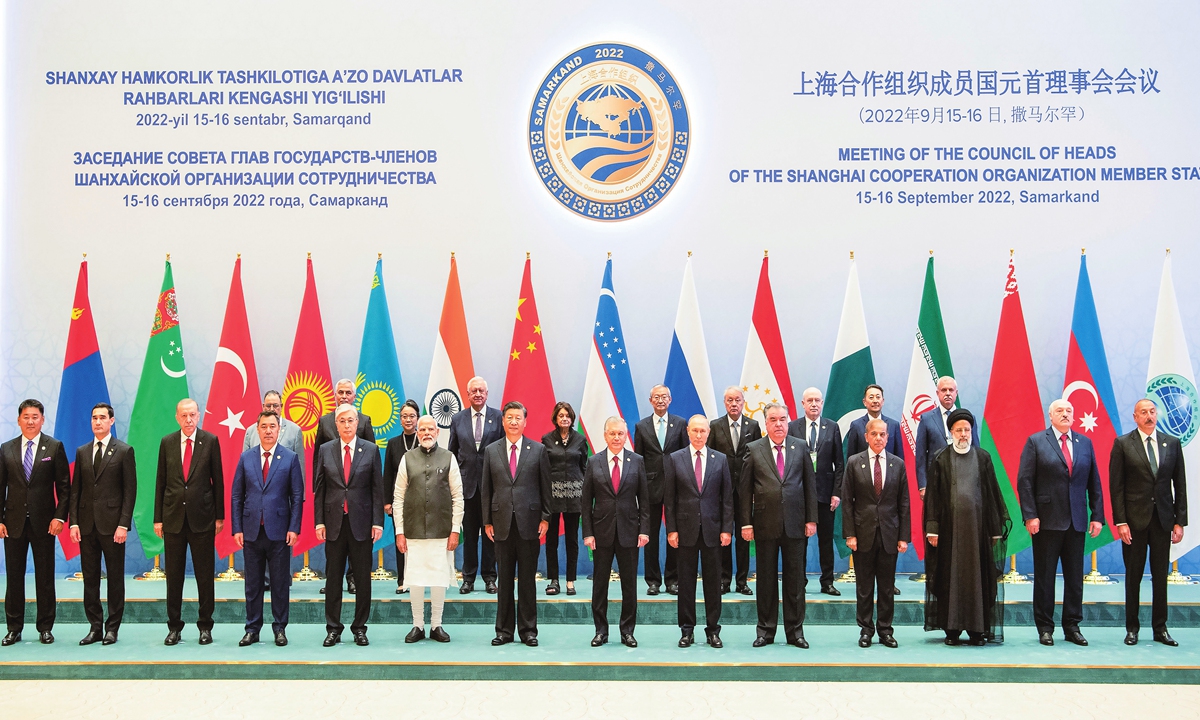Long Xingchun:Claims India will abandon SCO are wishful thinking

Chinese President Xi Jinping (seventh from left, front) and leaders of other Shanghai Cooperation Organization (SCO) member states, observer states and dialogue partners pose for a photo before the 22nd meeting of the Council of Heads of State of the SCO on September 16, 2022, in Samarkand, Uzbekistan. Photo: Xinhua
Indian Prime Minister Narendra Modi attended the SCO summit held in Samarkand, Uzbekistan on September 15-16 and had bilateral talks with leaders of many countries, including Russian President Vladimir Putin. During the summit, India took over the rotational presidency of the SCO and will hold it for one year until September 2023.
However, after the summit, some Western scholars who disapprove of the SCO hyped that the organization is not as important to India as the Quad mechanism is. An article on the Indian Express argued that if the Ukraine war weakens Russia and Moscow cannot meet New Delhi's defense needs, and if China adds too much pressure on India, then India may need the Quad more than some of the SCO countries.
India-Russia relations remain stable and are even deepening. Modi said when meeting Putin, "Today's era is not an era of war," which excited many Western media outlets who claimed Modi has directly rebuffed Moscow's special military operation in Ukraine. However, Modi was just uttering diplomatic rhetoric to express his concerns about the Russia-Ukraine conflict. Modi also stressed the India-Russia friendship was "unbreakable" and said their partnership would scale new heights.
In international politics, countries will often persuade parties concerned to exercise restraint and resolve disputes through peaceful means. Over the past six months since the outbreak of the Ukraine war, India's relationship with Russia has not been weakened, but was instead strengthened in several fields, including energy. It's still too early to predict the final outcome of the Russia-Ukraine conflict. It is ultimately wishful thinking if the West believes that Russia will be weakened and India will abandon Russia and the SCO.
The Indian Express op-ed also argued that China has placed too much security pressure on India, which makes New Delhi need the Quad even more. The deterioration of China-India relations is an important reason for India's shift toward the US and Quad. But the fact is the so-called China threat has been greatly exaggerated. The China-India conflict is mainly a border dispute, which can be resolved by peaceful means. China has no intention of encircling or containing India, let alone invading India.
Arguments that India would abandon SCO and move closer toward Quad have ignored the diversity of India's needs. In addition to the Quad, India has also participated in BRICS, Russia-India-China trilateral cooperation, the IBSA Dialogue Forum (India, Brazil, South Africa), and so on. Different from the US, India's participation in a certain mechanism is not to form an exclusive alliance, but to serve certain interests of India. India essentially pursues pragmatic diplomacy, which allows it to maintain its long-term policy of strategic autonomy.
India's participation in BRICS is to unite emerging countries in a struggle for the international political and economic order, bargain with Western developed countries and secure India's interests. Even if it has a bilateral conflict with China, India will safeguard the mechanism.
Likewise, India's participation in the SCO is much more than maintaining relations with Russia. The SCO is the largest and most important regional international organization in eastern Eurasia, and its functions have expanded from border negotiations to all-round cooperation including combating the "three evil forces" of terrorism, extremism and separatism, infrastructure interconnectivity, trade facilitation, finance and supply chains. These are what India needs.
The SCO's influence is growing, and more and more countries are seeking to become part of the group. India needs to maintain its presence in the SCO to avoid being left out. Besides, India believes the terrorist threats it faces mainly come from Pakistan, and it can use the SCO's anti-terrorism platform to communicate with or add pressure on Pakistan. India is also worried that if it is absent, China and Pakistan may use the SCO to deal with India.
The US views Quad as the pillar of its Indo-Pacific Strategy, but India does not benefit much from it, thus it stayed out of the joint declaration on the trade pillar of the Indo-Pacific Economic Framework ministerial meet in Los Angeles earlier this month. Therefore, for India, the Quad cannot replace the SCO.
The author is the president of Chengdu Institute of World Affairs.
https://enapp.globaltimes.cn/article/1275849

